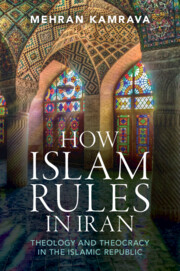Book contents
- How Islam Rules in Iran
- How Islam Rules in Iran
- Copyright page
- Contents
- Preface
- 1 Introduction
- 2 The Setting
- 3 A Question of Jurisprudence
- 4 Social Protection and Guidance
- 5 Rethinking the Islamic Republic
- 6 Theorizing Islamic Democracy
- 7 Legitimate Authority
- 8 Khameneism and the Absolute Velayat-e Faqih
- 9 Whither the Islamic Republic?
- Appendix Brief Biography of Some of the Figures Discussed
- Glossary
- Bibliography
- Index
7 - Legitimate Authority
Published online by Cambridge University Press: 02 May 2024
- How Islam Rules in Iran
- How Islam Rules in Iran
- Copyright page
- Contents
- Preface
- 1 Introduction
- 2 The Setting
- 3 A Question of Jurisprudence
- 4 Social Protection and Guidance
- 5 Rethinking the Islamic Republic
- 6 Theorizing Islamic Democracy
- 7 Legitimate Authority
- 8 Khameneism and the Absolute Velayat-e Faqih
- 9 Whither the Islamic Republic?
- Appendix Brief Biography of Some of the Figures Discussed
- Glossary
- Bibliography
- Index
Summary
At the broadest level, conceptions of the Islamic Republic’s political legitimacy are guided by one of three assumptions. The first assumption is that legitimacy is divinely bestowed, with the velayat-e faqih installed by God as someone who has the wisdom necessary to guide his people. There is no need for popular vote for the system to become legitimate, although there is no harm in it either. This popular vote is valid only when it has the leader’s approval. A second perspective assumes that God has given people the right and the ability to determine their own destiny and their affairs. Therefore, according to the shari‘ah, legitimacy rests with the people. A third outlook bridges these two perspectives, maintaining that while legitimacy is exclusively divine in genesis, it is practically irrelevant without acceptability, which makes the system functional when people participate in it. Legitimacy comes only from God, while it is the people who give the system the acceptance it needs by deciding what is in their interests. Moreover, acceptance has the added benefit of drawing people closer to the political system.
- Type
- Chapter
- Information
- How Islam Rules in IranTheology and Theocracy in the Islamic Republic, pp. 238 - 263Publisher: Cambridge University PressPrint publication year: 2024

